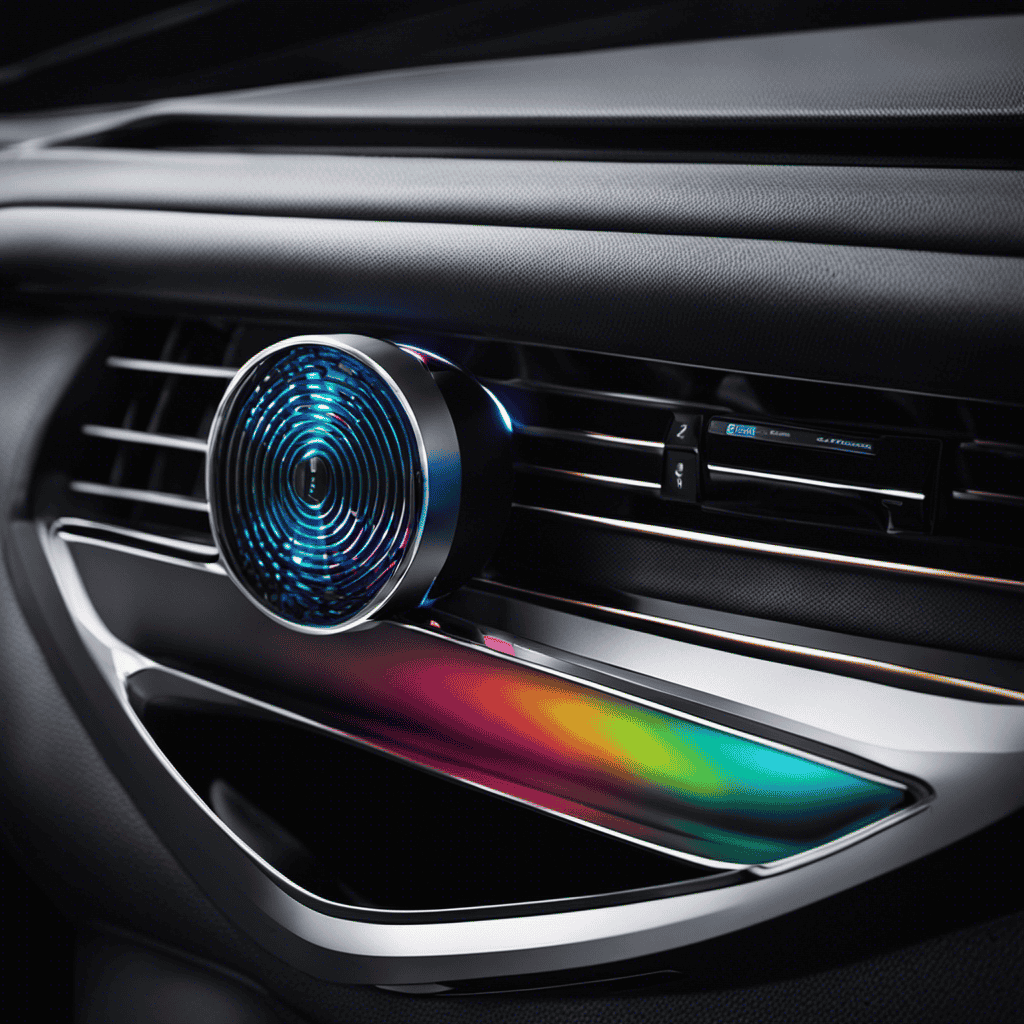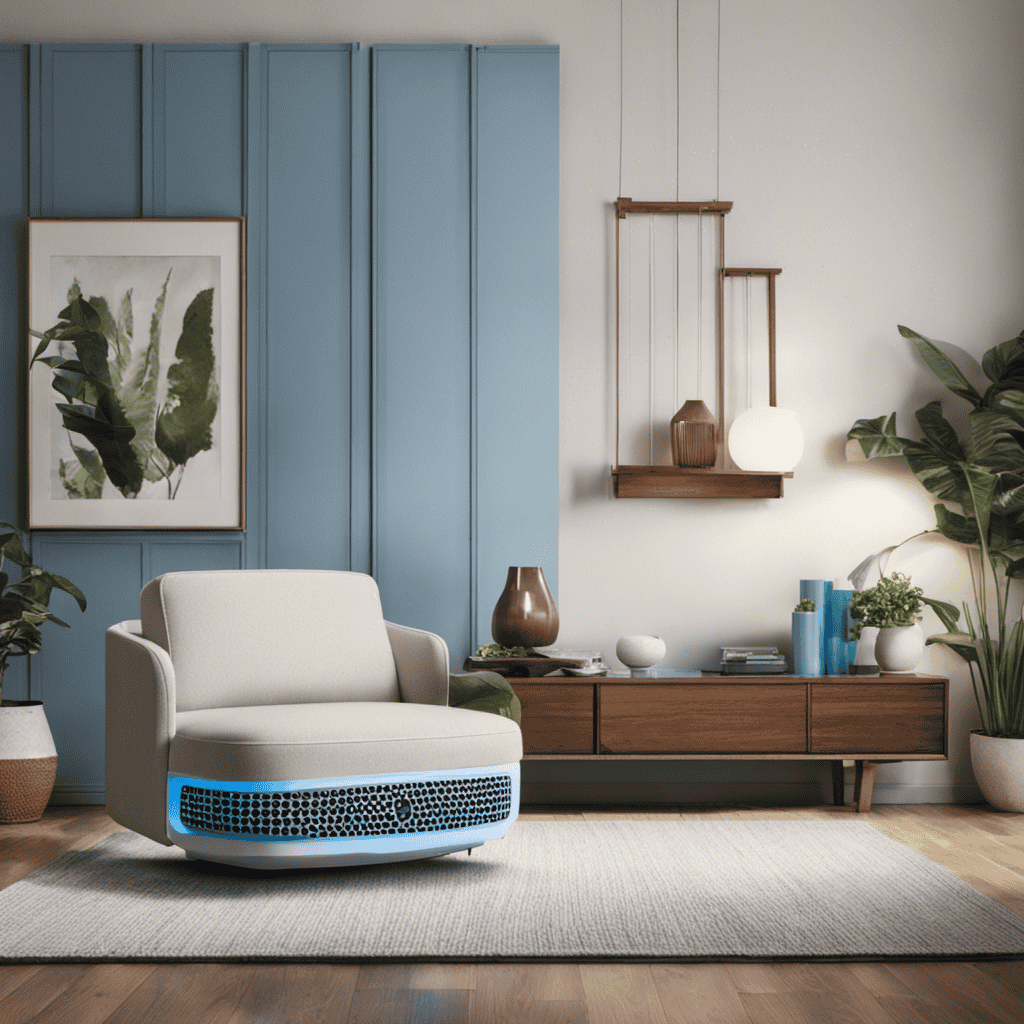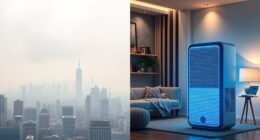Have you ever thought about whether the air in your home is clean and healthy? I have some news for you: it may not be. Poor indoor air quality can significantly affect your health and well-being.
But don’t worry, there’s a solution: an air purifier. In this article, I’ll walk you through the signs that indicate you might need an air purifier, the common pollutants you should be aware of, and the benefits of using one.
So let’s dive in and take control of the air we breathe!
Key Takeaways
- Coughing, sneezing, and itchy eyes are common symptoms of poor indoor air quality.
- Exposure to indoor pollutants can lead to respiratory problems, allergies, and even lung cancer.
- Common indoor air pollutants include dust, pet dander, mold spores, and volatile organic compounds (VOCs).
- Factors to consider in determining if you need an air purifier include the presence of common indoor air pollutants, sensitivity to allergens, importance of air circulation, and the potential for respiratory issues and allergies caused by dust, pet dander, and mold spores.
Symptoms of Poor Indoor Air Quality
If you’re experiencing symptoms like coughing, sneezing, and itchy eyes, you may need an air purifier to improve your indoor air quality. Poor indoor air quality can often trigger allergies and respiratory issues, leading to discomfort and health problems.
According to research, indoor air can be two to five times more polluted than outdoor air. This is due to various factors such as dust, pet dander, mold spores, and volatile organic compounds (VOCs) emitted from cleaning products and furniture. These pollutants can irritate the respiratory system, causing coughing, sneezing, and itchy eyes.
By investing in an air purifier, you can effectively remove these allergens and pollutants, providing cleaner and healthier air for you and your family.
Now let’s take a closer look at some of the common indoor air pollutants.
Common Indoor Air Pollutants
You should be aware of the common indoor air pollutants that can affect your health.
Indoor air pollution refers to the presence of harmful contaminants in the air we breathe indoors. These pollutants can come from various sources such as tobacco smoke, household cleaning products, building materials, and outdoor air pollution that seeps indoors.
Exposure to these pollutants can lead to a range of health risks including respiratory problems, allergies, asthma, and even more serious conditions like lung cancer. According to the World Health Organization, around 4.3 million people die each year due to indoor air pollution-related illnesses.
Some of the most common indoor air pollutants include particulate matter, volatile organic compounds (VOCs), carbon monoxide, radon, and mold.
Regularly monitoring and improving indoor air quality is crucial for maintaining a healthy living environment.
Factors to Consider in Determining if You Need an Air Purifier
Consider various factors when determining whether an air purifier is necessary for your indoor environment.
Factors to consider include the presence of common indoor air pollutants, the sensitivity of individuals in your home to allergens, and the importance of air circulation.
Indoor air pollutants such as dust, pet dander, and mold spores can contribute to respiratory issues and allergies. If you or your family members have asthma or allergies, an air purifier may be beneficial in reducing symptoms.
Additionally, if your home has poor air circulation or is located in an area with high outdoor pollution, an air purifier can help remove harmful particles from the air.
By considering these factors, you can make an informed decision about whether an air purifier is necessary for your home.
In the following section, we will explore signs that your home may benefit from an air purifier.
Signs That Your Home May Benefit From an Air Purifier
There are several signs that your home could benefit from an air purifier. Indoor air pollution is a serious problem that can affect our health and well-being. Studies have shown that indoor air can be up to five times more polluted than outdoor air.
Common pollutants include dust, pet dander, pollen, mold spores, and volatile organic compounds (VOCs). Breathing in these pollutants can lead to respiratory problems, allergies, and other health issues.
An air purifier can help to reduce these contaminants, improving the overall air quality in your home. It filters out particles as small as 0.3 microns, trapping them in the filter and preventing them from circulating in the air.
Benefits of Using an Air Purifier
To improve indoor air quality and reduce respiratory issues, using an air purifier is beneficial. Not only does it provide a cost-effective solution, but it also has a significant impact on allergies.
Air purifiers work by removing airborne pollutants, such as dust, pollen, pet dander, and mold spores, from the air. These particles can trigger allergies and respiratory problems, making it essential to eliminate them. By using an air purifier, you can effectively trap and remove these allergens, reducing the risk of allergic reactions and improving overall air quality.
Studies have shown that air purifiers can significantly reduce symptoms related to allergies, such as sneezing, coughing, and itchy eyes. Additionally, air purifiers can help alleviate asthma symptoms by removing asthma triggers from the air.
Investing in an air purifier is a simple yet effective way to create a healthier indoor environment for you and your family.
Frequently Asked Questions
Can an Air Purifier Completely Eliminate All Indoor Air Pollutants?
An air purifier can effectively reduce indoor air pollutants, but it may not completely eliminate them. While it can improve air quality, it has limitations and cannot remove all particles or gases.
How Often Should I Replace the Filters in My Air Purifier?
I clean my air purifier filters regularly to ensure they’re working efficiently. Signs of a dirty filter include reduced air flow and an increase in dust and allergens.
Can an Air Purifier Help With Allergies and Asthma?
An air purifier can greatly benefit those with allergies and asthma. It is effective at removing allergens and irritants from the air, providing relief and improving indoor air quality.
Are There Any Potential Health Risks Associated With Using an Air Purifier?
Using an air purifier can have potential side effects, but the long-term effects are minimal. It is important to choose a high-quality purifier and follow manufacturer’s instructions to avoid any health risks.
Can an Air Purifier Remove Odors From My Home?
An air purifier can effectively remove odors from my home by trapping and eliminating airborne particles that cause unpleasant smells. Regular maintenance, such as cleaning filters, ensures optimal performance and odor elimination.
What Should I Consider When Deciding If I Need an Air Purifier?
When deciding if you need an air purifier, consider the best air purifier features that meet your needs. Look for a model with HEPA filters to remove allergens, activated carbon for odors, and a strong fan for air circulation. Consider room size and maintenance requirements before making a decision.
Conclusion
In conclusion, after examining the symptoms of poor indoor air quality and the common pollutants that can affect our homes, it becomes clear that an air purifier can be a valuable addition to any household.
By considering factors such as allergies, respiratory conditions, and the presence of pets or smokers, you can determine if an air purifier is necessary.
The benefits of using an air purifier, such as improved air quality, reduced allergens, and a healthier living environment, make it a worthwhile investment.
So why not take a breath of fresh air and consider getting an air purifier today?










